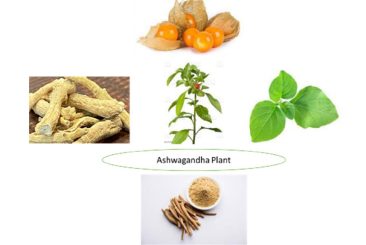In today’s modern world, stress has become a prevalent and unavoidable aspect of life. With our increasing daily responsibilities and limited time for relaxation and rejuvenation, our mental health is often impacted. Sleep problems are also widespread, and achieving quality sleep is challenging for many. Lack of sleep and stress are known risk factors for various chronic diseases, including diabetes and cardiovascular ailments. Ayurveda, an ancient medicinal practice, holds a wealth of traditional remedies like Ashwagandha that have been used for centuries and can contribute significantly to overall well-being.
We explore the remarkable benefits of Ashwagandha, an Ayurvedic herb known for its potential to enhance stress management and alleviate symptoms of anxiety and depression. Ashwagandha, scientifically known as Withania somnifera, has earned a reputation as a wonder herb for mental health within Ayurveda. The name “ashwagandha” is derived from the Sanskrit words “ashwa” (meaning horse) and “gandha” (meaning smell), attributed to the distinct smell of the plant’s roots. The Latin term “somnifera” means sleep-inducing, underscoring one of its key properties. This ancient herb has been documented in texts dating back as far as 6000 years and has been recognized for its diverse therapeutic qualities, including being a potent Rasayana—a substance that rejuvenates and revitalizes the body.
Ashwagandha is revered for its ability to boost both physical and mental strength, making it a valuable resource for coping with stress. It has traditionally been administered to individuals dealing with anxiety, depression, and sleep disorders to help alleviate their symptoms. The herb’s multifaceted properties include being a tonic, aphrodisiac, narcotic, diuretic, anthelmintic, astringent, thermogenic, and stimulant. As such, Ashwagandha has played a pivotal role in Ayurvedic medicine, contributing to the overall well-being of individuals.
The ancient wisdom of Ayurveda continues to be relevant in our contemporary lives, offering solutions to some of the most pressing health and wellness challenges we face, including stress management and mental health. this is just one example of the many natural remedies found within Ayurvedic practices that hold the potential to enhance our modern-day well-being.
Benefits of ashwagandha for mental health:
Ashwagandha’s versatility extends far beyond its role in mental health. This ancient remedy finds its place in a wide array of traditional applications. It is commonly added to children’s milk as a tonic to enhance strength and growth during their formative years. Additionally, Ashwagandha has been employed to combat ailments such as rheumatism and arthritis due to its anti-inflammatory properties. It is also recognized for its potential in addressing conditions like leukoderma, constipation, insomnia, nervous breakdowns, and goitre, further highlighting its significance in holistic well-being. This herb, deeply rooted in Ayurvedic wisdom, offers a comprehensive approach to health and vitality.

“This is a powerful herb that can have positive effects on mental health. It’s known to reduce stress, anxiety, and symptoms of depression. By balancing the body’s stress hormones, it helps in calming the mind and promoting a sense of well-being. Many studies have shown its effectiveness in improving mood and reducing the symptoms related to various mental health conditions”, states Ayush Aggarwal, Founder, RASAYANAM.
Benefits of different parts of ashwagandha:
Ashwagandha is a remarkable plant that offers various medicinal uses across its different parts:

- Ashwagandha Leaves: The leaves of Ashwagandha are known for their bitterness and are often recommended in the treatment of fever and painful swellings. They may possess properties that help reduce inflammation and alleviate discomfort.
- Ashwagandha Flowers: The flowers of Ashwagandha have diverse properties, including astringent, depurative (blood-purifying), diuretic (promoting urine production), and aphrodisiac (stimulating sexual desire). These attributes make them valuable in addressing various health concerns.
- Ashwagandha Seeds: Ashwagandha seeds are recognized as anthelmintic, meaning they have the ability to expel intestinal worms. When combined with astringent substances and rock salt, they can be used to remove white spots from the cornea, suggesting potential benefits for eye health.
- Ashwagandha Rishta: Ashwagandha Rishta is a traditional Ayurvedic preparation made from Ashwagandha and other ingredients. It is utilized in the treatment of conditions such as hysteria, anxiety, memory loss, and syncope (fainting). Additionally, Ashwagandharishta is known to act as a stimulant and may contribute to an increase in sperm count, making it relevant in the context of reproductive health.
Other benefits:
Ashwagandha is a versatile herb with a wide range of potential health benefits:
- Prevention of Stress-Induced Ulcers: Ashwagandha has been shown to help prevent stress-induced ulcers in the gastrointestinal tract. Its adaptogenic properties make it effective in mitigating the harmful effects of stress on the digestive system.
- Cancer Protective Qualities: Research suggests that Ashwagandha possesses cancer-protective qualities. It may serve as an adjunct to cancer chemotherapy or radiotherapy, potentially enhancing their effectiveness while providing support to patients undergoing cancer treatment.
- Neurodegenerative Diseases: Ashwagandha has shown promise in its positive effects on patients suffering from neurodegenerative diseases such as Parkinson’s, Huntington’s, and Alzheimer’s diseases. While it may not provide a cure, it can potentially help alleviate symptoms and improve overall well-being.
- Anti-Depressant Effect: Ashwagandha is known to have anti-depressant properties, making it a potential aid for individuals dealing with depression. It can contribute to their recovery and improve mental health.
- Anti-Arthritis Effect: Ashwagandha has demonstrated anti-arthritis effects and may help soothe the nervous system’s pain response. This can be beneficial for individuals dealing with arthritis or related inflammatory conditions.
These diverse health benefits underscore the therapeutic potential of Ashwagandha and its valuable role in traditional medicine systems like Ayurveda. While it’s essential to consult with healthcare professionals for specific health concerns, Ashwagandha’s natural properties offer a promising avenue for holistic well-being.
How ashwagandha was used in ancient times:
It’s roots in ancient Ayurveda are deeply ingrained, and it falls within a sub-group of Rasayanas known as Medhyarasayanas. The term “Medha” in Medhyarasayanas is associated with the mind, emphasizing their role in promoting mental well-being and cognitive function.
“In ancient times, ashwagandha was commonly used in Ayurveda. It was considered a rejuvenating herb and was used to boost the immune system, increase energy levels, and improve overall vitality. People used different parts of the plant, such as its roots and leaves, to create tonics, powders, and teas to promote general health and well-being. One of the strongest forms of Ashwagandha is Ashawagandhas KSM66 which is extracted directly from the root with highest concentration of Ashwagandha plant. It is also known as the biggest source to boost cognitive functions in the human anatomy,” states Aggarwal.
How to consume ashwagandha:
“Ashwagandha can be consumed in various forms. It’s available as a powder, capsule, or liquid extract. One can mix the powder with warm water, milk, or honey and consume it as a drink. Capsules are convenient for precise dosage. It can be taken as a post-workout supplement for faster muscle recovery and relaxing mind and body,” attachss Aggarwal.
Who shouldn’t have ashwagandha:
Ashwagandha indeed provides a range of health benefits, but it’s essential to exercise caution and consider specific precautions:
- Pregnant and Breastfeeding Women: Pregnant and breastfeeding women should avoid Ashwagandha supplementation, as the effects of this herb on pregnancy and lactation are not well understood. It’s crucial to prioritize the safety of both the mother and the infant during these critical periods.
- Autoimmune Diseases: Individuals with autoimmune diseases, such as rheumatoid arthritis or lupus, should exercise caution when considering Ashwagandha. This herb has the potential to stimulate the immune system, which may exacerbate autoimmune conditions. Consulting a healthcare provider before use is advisable in such cases.
- Surgery: If you have surgery scheduled, it’s recommended to discontinue Ashwagandha consumption at least two weeks before the surgery. This precaution is essential to avoid potential interactions between Ashwagandha, anesthesia, and other medications used during surgery, which could impact the surgical process or recovery.
As with any supplement or herbal remedy, it’s wise to consult with a healthcare professional before incorporating it into your healthcare regimen, especially if you fall into one of the mentioned categories or have underlying health concerns.
Interesting facts about ashwagandha:
- Historical Significance: Ashwagandha boasts a rich historical background, with its use dating back thousands of years in traditional Indian medicine, making it one of the oldest known medicinal herbs. Its enduring presence in traditional practices reflects its enduring value.
- Adaptogenic Properties: Ashwagandha is recognized as an adaptogen, a classification for substances that help the body adapt to various stressors and promote overall balance. It aids the body in managing both physical and mental stress, underlining its adaptability.
- Botanical Name: Its scientific name, Withania somnifera, is derived from the Latin words “somnifera,” signifying sleep-inducing qualities. This name highlights its ability to have a calming and soothing effect on the nervous system.
- Multiple Health Benefits: Beyond its impact on mental health, Ashwagandha is versatile and offers a range of health benefits. It is used to enhance physical performance, increase muscle mass and strength, and promote overall vitality. Its holistic contributions to well-being make it a valuable natural remedy.
In summary, Ashwagandha is a widely recognized herb with a long history of use in traditional medicine, particularly Ayurveda. It is classified as an adaptogen and is known for its stress-reducing properties. It may help alleviate stress, improve sleep, boost the immune system, enhance cognitive function, and provide various other health benefits. While research supports many of these claims, individual responses may vary, and it’s important to consult with a healthcare professional before incorporating Ashwagandha into your wellness routine. Overall, Ashwagandha is a natural remedy with the potential to promote well-being and improve resilience to stressors.
Disclaimer:
The information contained in this article is for educational and informational purposes only and is not intended as a health advice. We would ask you to consult a qualified professional or medical expert to gain additional knowledge before you choose to consume any product or perform any exercise.









